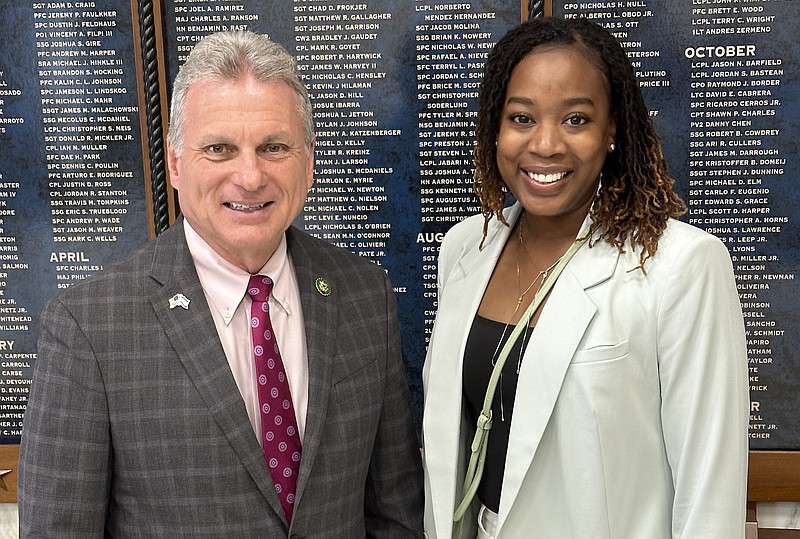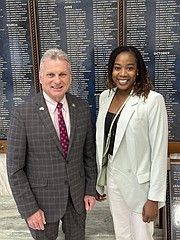A Cleveland, Tennessee, woman was invited to attend Thursday's State of the Union address as a special guest of U.S. Rep. Buddy Carter, R-Georgia, to raise awareness of sickle cell disease and treatment.
Jennelle Stephenson, a behavioral analyst who moved to Cleveland in September, has lived with sickle cell her entire life. Six years ago, she participated in a clinical trial for a gene therapy touted as a potentially curative treatment for the disease. In December, that gene therapy, lyfgenia by biotechnology company Bluebird Bio, received approval from the Food and Drug Administration.
Stephenson traveled to the nation's capitol to speak with government officials about sickle cell and inform them of the new gene therapy, advocating for accessibility to the treatment now that it has received approval.
"They were so excited and just so happy that something was being done in the community for sickle cell disease, and they were responsive and receptive to, yes, this needs to be accessible," Stephenson said by phone Friday. "So, I thought it went very well."
Chattanooga native Jon Meacham was among those advising President Joe Biden as he prepared for the State of the Union speech.
The Associated Press reported that Biden was surrounded by his closest White House aides and other advisers at Camp David last weekend. That included White House chief of staff Jeff Zients, deputy chief of staff Bruce Reed, senior adviser Anita Dunn, director of speechwriting Vinay Reddy, counselor to the president Steve Ricchetti, aide Mike Donilon and historian Meacham, whom Biden has relied on in the past for historical context and expertise.
Meacham was born in Chattanooga in 1969 and is a graduate of the McCallie School, former editor in chief of Newsweek and author of several books including "American Lion: Andrew Jackson in the White House," which won the Pulitzer Prize in 2009.
Stephenson had the opportunity to sit in as President Joe Biden gave his State of the Union address, describing it as a once-in-a-lifetime experience. During the address, in regard to health care, Biden spoke on reducing costs for prescription drugs, expanding Medicare's power to negotiate lower prices over the next decade, continuing efforts to protect and expand the Affordable Care Act, launching a research initiative on women's health and supporting the efforts of the Advanced Research Projects Agency for Health.
(READ MORE: Signal Mountain man who donated more than 70 gallons of blood says 'life is precious')
While the president did not specifically mention sickle cell in his address, Stephenson approved of his comments.
"I was appreciative of him acknowledging the strides that we are making in health care and innovations in the health care sector, and for me, that's important because clearly a cure for sickle cell is one of those innovations that I'm excited about," she said.
Sickle cell disease causes red blood cells to be hard, sticky and crescent-shaped rather than round, with the sickle cells clogging blood flow and dying off faster than normal cells. For Stephenson, the disease has caused her to experience chronic pain and exhaustion.
"You never really knew what the day was going to bring, like some days were great and other days, just out of the blue, you could end up in a sickle cell crisis and end up in a hospital for the next few weeks or however long your stay was — it varied all the time," Stephenson said. "So, that was kind of life for me ever since I could remember and just trying to get through my day-to-day and survive life with sickle cell."
An estimated 100,000 Americans have sickle cell disease, according to Centers for Disease Control and Prevention data. People of African descent are disproportionately affected by the disease, with it occurring in about 1 in 365 African American births, according to the CDC. About 1 in 13 African American babies are born with sickle cell trait, which is inherited but is not sickle cell disease, according to the American Red Cross.
Traditionally, those with the disease undergo frequent blood transfusions as part of treatment. While the disease predominantly affects Black people, only a small population of blood donors are Black, according to Caitlin Stanley, senior director of marketing and communications for Blood Assurance, a nonprofit blood center serving the Southeast region. And yet, 1 in 3 African Americans are a match for people with sickle cell, Stanley said by phone Thursday.
(READ MORE: Chattanooga pastors plead for more Black blood donors)
"When someone receives multiple transfusions over their lifetime, the makeup of the type of blood that they need can become different because they can build up antibodies against the types," she said. "So they need a very specific blood type at that point after they've had multiple transfusions. So that's why it's so important that we find the right match for them, which is most always a genetically similar match."
By having a diverse blood supply, Blood Assurance is better able to match donor blood to patients in need, Stanley said. In addition to receiving blood, platelets and plasma, the blood center offers testing that informs people of whether they possess the sickle cell trait.
For Stephenson, the blood transfusions were only a short fix, which is why she sought out a clinical trial, she said. As part of the trial, Stephenson received an infusion of recoded cells with the intent of preventing the production of sickle cells by the body, she said. Since the trial, Stephenson has not had another sickle cell crisis nor has she experienced sickle cell-related pain, she said.
Contact Sam Still at sstill@timesfreepress.com or 423-757-6579

